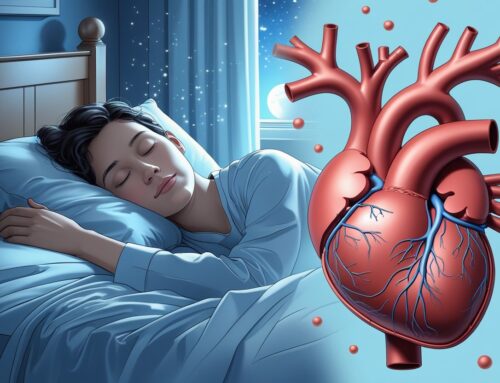Eating late at night and then going straight to sleep can affect the body in several ways. When you eat close to bedtime, your digestive system is still active, even though your body is trying to rest. This can mess with your natural rhythms and might cause issues like acid reflux or make it harder to fall asleep.
The impact of late-night eating depends on what you eat and your overall health. Some people might feel discomfort or notice poor sleep quality, while others might not be affected at all. Sometimes, eating before bed can actually help stabilize blood sugar levels and curb cravings, but it’s important to get the timing and food choices right to avoid any negative effects.
Understanding what happens when you eat late can help you make better decisions about your evening meals and get better rest overall.
Key Takeaways
- Eating late can disrupt sleep and digestion.
- What and when a person eats at night matters for health.
- Proper timing of meals supports better sleep quality.
- A supportive mattress can help counteract some of the discomfort caused by late-night eating by promoting better sleep posture and reducing the risk of acid reflux.
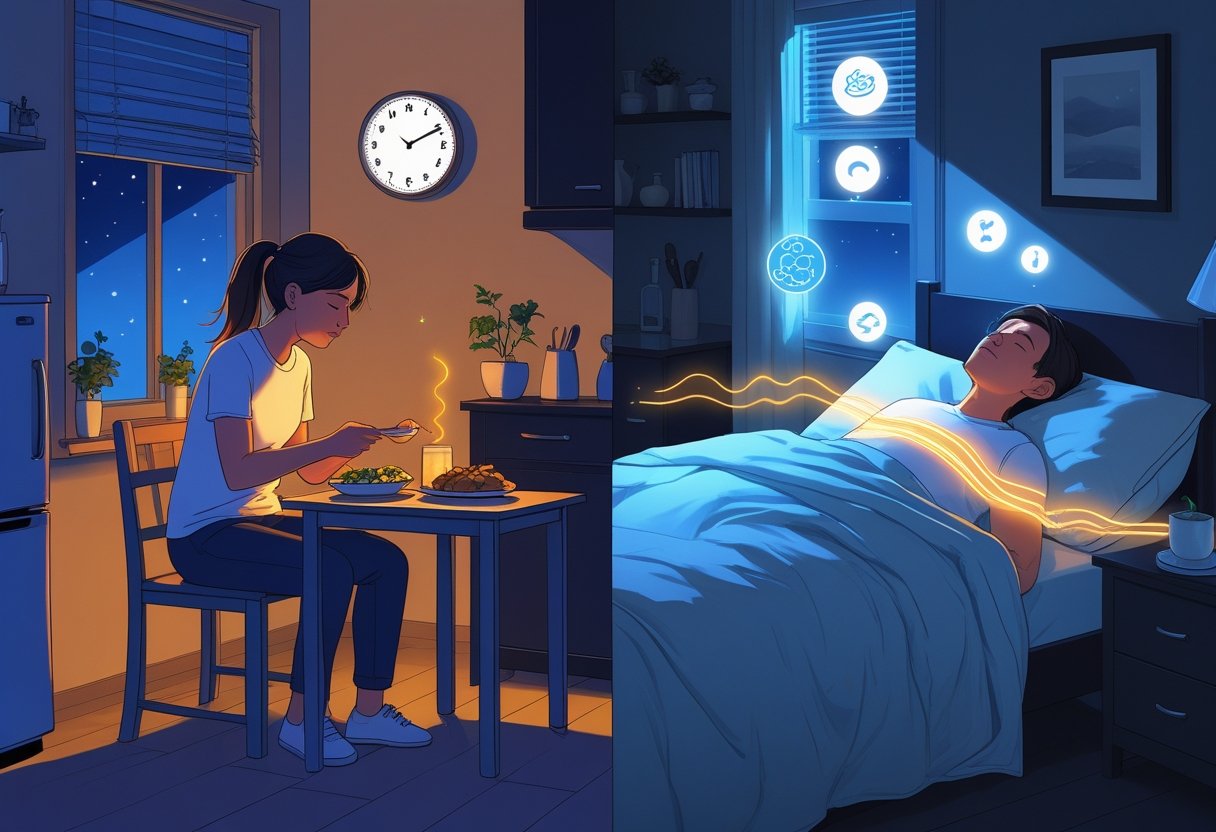
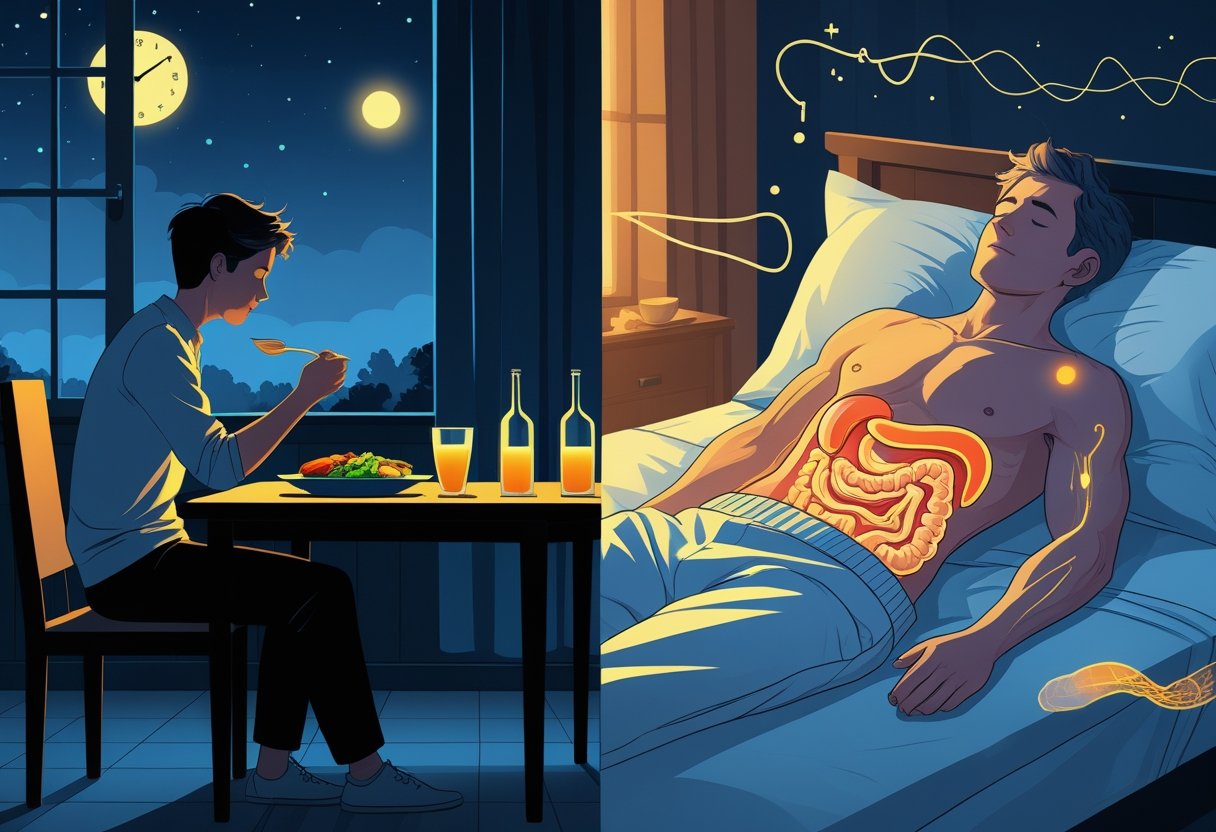
Eating close to bedtime can affect how your body works during sleep. It changes how you digest food and slows down your metabolism, which can lead to discomfort and other issues. These effects happen because your body isn’t really ready to handle food efficiently right before you rest.
Digestive Processes During Sleep
When you eat late at night and then go to sleep, your stomach starts making acid and enzymes to break down the food. But lying down right after eating can cause that stomach acid to move up into your esophagus, which can lead to acid reflux or heartburn. Digestion also slows during sleep because your body is focusing on resting and repairing. Food can hang out in your stomach longer, which might leave you feeling bloated or uncomfortable. This slower process can disturb your sleep and even cause you to wake up during the night.
Choosing lighter, smaller snacks before bed can help reduce these digestive problems. Avoiding heavy meals at night helps your stomach empty faster and keeps you from feeling that discomfort that comes from eating and then immediately sleeping.
Impact on Metabolism
Eating before bed can throw off your body’s natural circadian rhythm—the internal clock that tells you when to eat, sleep, and digest. Late-night eating triggers insulin and blood sugar changes at a time when your body is less responsive to these hormones. This metabolic disruption might lead to higher blood sugar levels and lower fat burning during the night. Over time, it can contribute to weight gain and make blood sugar harder to manage.
Eating late at night might also affect how your body controls blood pressure, which could increase the risk for certain health issues. Keeping your last meal a few hours before you go to bed supports better metabolic function and helps improve overall health.
Eating late at night can change how well you sleep. It might cause problems like trouble falling asleep, lighter sleep, or waking up more often. These effects happen because of how your body handles digestion and how that affects your sleep cycles.
Sleep Disruptions From Late Eating
Eating before bed often keeps your body busy digesting food when it should be winding down. This can lead to restless sleep since your stomach is still active. Heavy or rich foods are more likely to cause this issue.
People who eat close to bedtime might find their sleep quality gets worse, and they may wake up more during the night. This can cut down on the amount of deep and REM sleep you get—both of which are important for feeling rested. Eating late at night might also cause heartburn or acid reflux, making it even harder to sleep. Altogether, these disruptions can make it tough to get the restorative sleep you need, leaving you feeling tired the next day.
Does Eating Late Affect Sleep Patterns?
Eating late can mess with your normal sleep patterns by making it take longer to fall asleep. This delay is called increased sleep latency, and it often happens after having late-night snacks.
Regularly eating late might also reduce your total sleep time by about 25 minutes on average. It can lower your sleep efficiency, which means that the time you spend in bed isn’t fully spent sleeping. This can throw off the natural cycle of light, deep, and REM sleep stages. Eating late can also lead to inconsistent meal times, which can confuse your body’s internal clock. This can make it harder to keep stable sleep patterns and overall sleep quality. More details about this can be found in research about how eating before bed affects sleep.
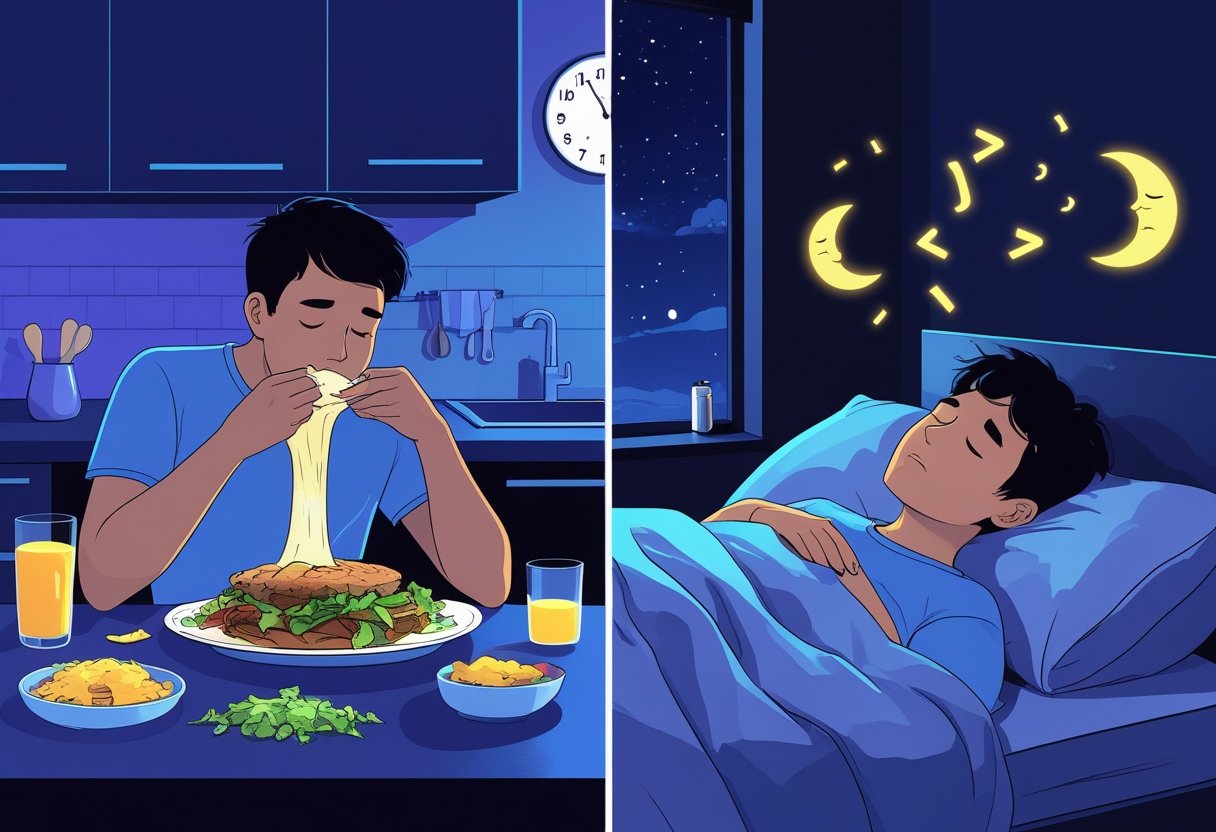
Eating habits before bedtime can affect digestion, sleep quality, and your overall health. Knowing when to stop eating and how long to wait before bed can help reduce discomfort like acid reflux and support better blood sugar control.
How Many Hours Before Bed Should You Stop Eating
Experts generally agree that it’s best to stop eating at least 2 to 3 hours before bed. This gives your body enough time to digest the food and lowers the chances of acid reflux or indigestion while you sleep. Eating too close to bedtime can disrupt the natural digestive process. When digestion happens while you’re lying down, it can lead to heartburn and affect your sleep quality. Giving yourself 2 to 3 hours lets the stomach partially empty, which makes it easier to drift off to sleep.
Different people might need slightly different timing depending on their metabolism or how big the meal was. If you have digestive issues, you might benefit from waiting even longer to help ease symptoms.
What Time Should You Stop Eating at Night
The best time to stop eating mostly depends on your usual bedtime. For example, if you usually go to bed at 10 p.m., it’s a good idea to stop eating by 7 p.m. or even earlier. Eating earlier in the evening also helps your body regulate blood sugar and blood pressure better while you sleep. Eating late, especially heavy or rich foods, can lead to blood sugar spikes or other discomforts.
Planning your last meal for the early evening helps support better overall health and makes digestion easier. For people who go to bed earlier or have certain health issues, it might be best to stop eating even earlier in the day.
How Long Should You Wait to Sleep After Eating
Most nutrition and sleep experts suggest waiting at least 2 to 3 hours between your last meal and bedtime. This window gives your stomach time to start breaking down food, which promotes more restful sleep.
Lying down too soon after eating can raise the risk of acid reflux since stomach acid can more easily move upward when your body is horizontal. This waiting period also helps prevent energy from being diverted to digestion when your body should be winding down. Some foods take longer to digest, so heavier meals might mean you need to wait even longer. Even with lighter snacks, it’s a good idea to eat cautiously close to bedtime.
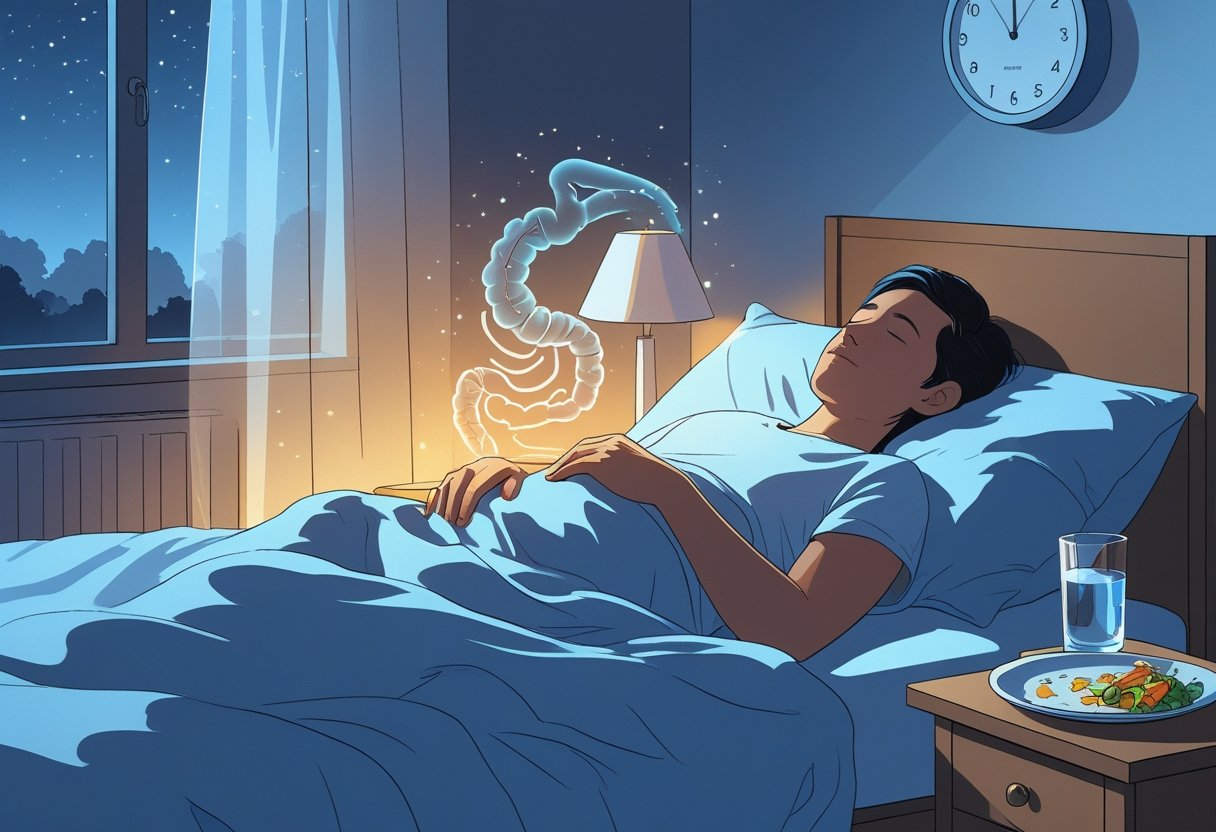
Eating late at night can have specific effects on the body that impact both weight and digestion. These effects often depend on the timing, size, and type of food eaten before sleep.
Weight Gain and Metabolic Changes
Eating right before bed can lead to weight gain because your body’s metabolism slows down while you sleep. When you eat late at night, your body doesn’t process sugars and fats as well. This means more of that food might get stored as fat instead of being used for energy.
Late-night eating can also mess with your body’s circadian rhythm, which controls things like insulin production and blood sugar levels. Over time, this disruption can raise your risk of insulin resistance and type 2 diabetes. Studies show that people who eat most of their calories late in the day tend to have higher body weight and worse blood sugar control compared to those who eat earlier.
Gastrointestinal Issues
Eating a large meal right before bed can cause digestive problems. When you lie down soon after eating, your body may struggle to move food through the digestive system efficiently. This can lead to discomfort like acid reflux, heartburn, or indigestion. Acid reflux happens when stomach acid moves back up into the esophagus, causing that burning sensation and irritation. This is more likely to happen when your stomach is full right before lying down. Chronic acid reflux can damage the esophagus and disturb your sleep quality.
Smaller, lighter snacks might not cause as many problems, but heavy or spicy meals late at night can increase the chances of waking up with stomach discomfort. Poor digestion at night can also affect how well you sleep and how you feel the next day.
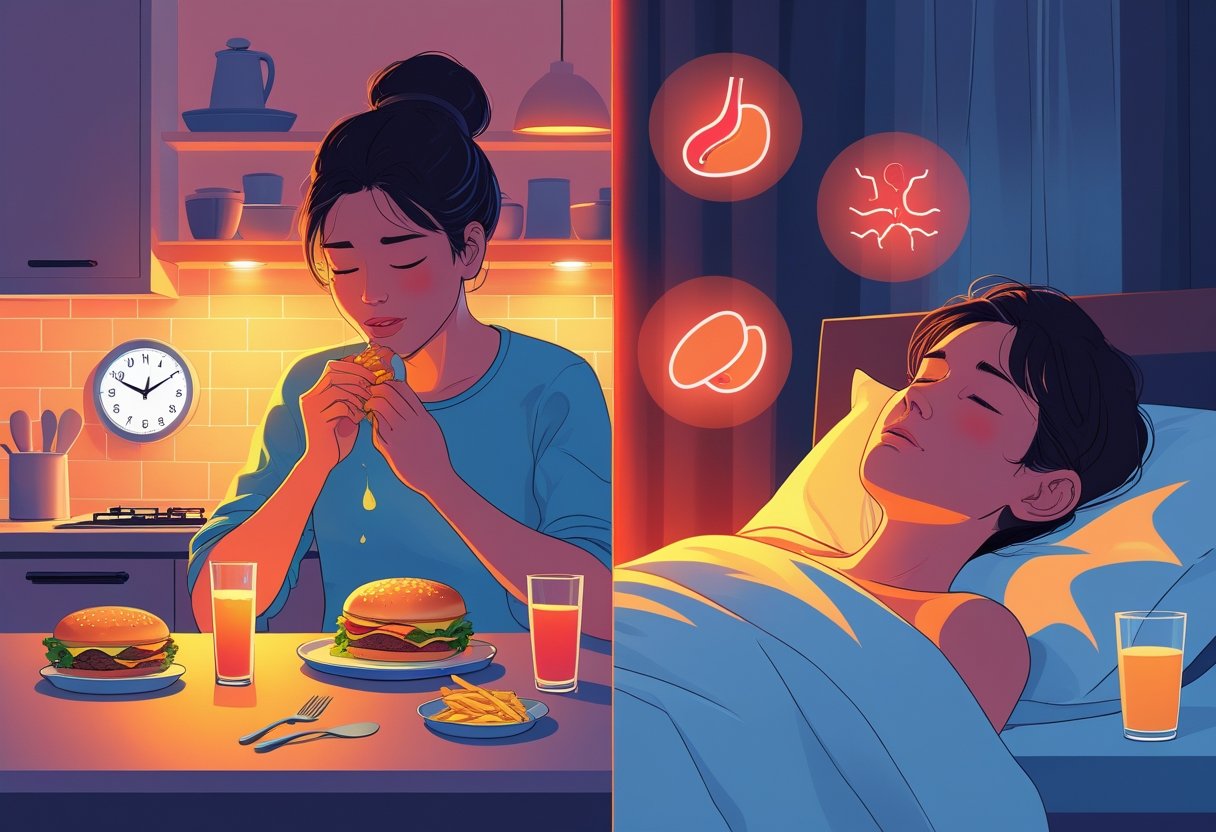
Eating before bed can actually help some people manage hunger and improve sleep quality. When done at the right time and with the right foods, it may even support metabolism and keep energy levels steady overnight.
When Eating Before Bed Is Helpful
Having a small, balanced snack before bed can keep you from waking up hungry in the middle of the night. That’s important because hunger can lead to discomfort or even restless sleep.
Some studies suggest that a light bedtime snack can help regulate your metabolism. Your body still uses energy while you’re sleeping, so a small snack might help keep things running smoothly. It’s best to skip heavy or high-fat meals late at night, since those can cause indigestion or heartburn. Giving your body time to digest before lying down helps avoid those issues and supports better rest.
Who Should Consider a Pre-Sleep Snack
People who have a long stretch between dinner and breakfast might benefit from a bedtime snack to avoid low blood sugar overnight. Athletes or anyone who’s really active during the day may find that eating before bed helps with muscle recovery and energy replenishment.
Anyone who feels hungry before bed and has trouble falling asleep could try a small snack like yogurt, a banana, or a handful of nuts. Choosing snacks with nutrients that promote sleep like tryptophan or magnesium can be more helpful than grabbing sugary or heavy foods.
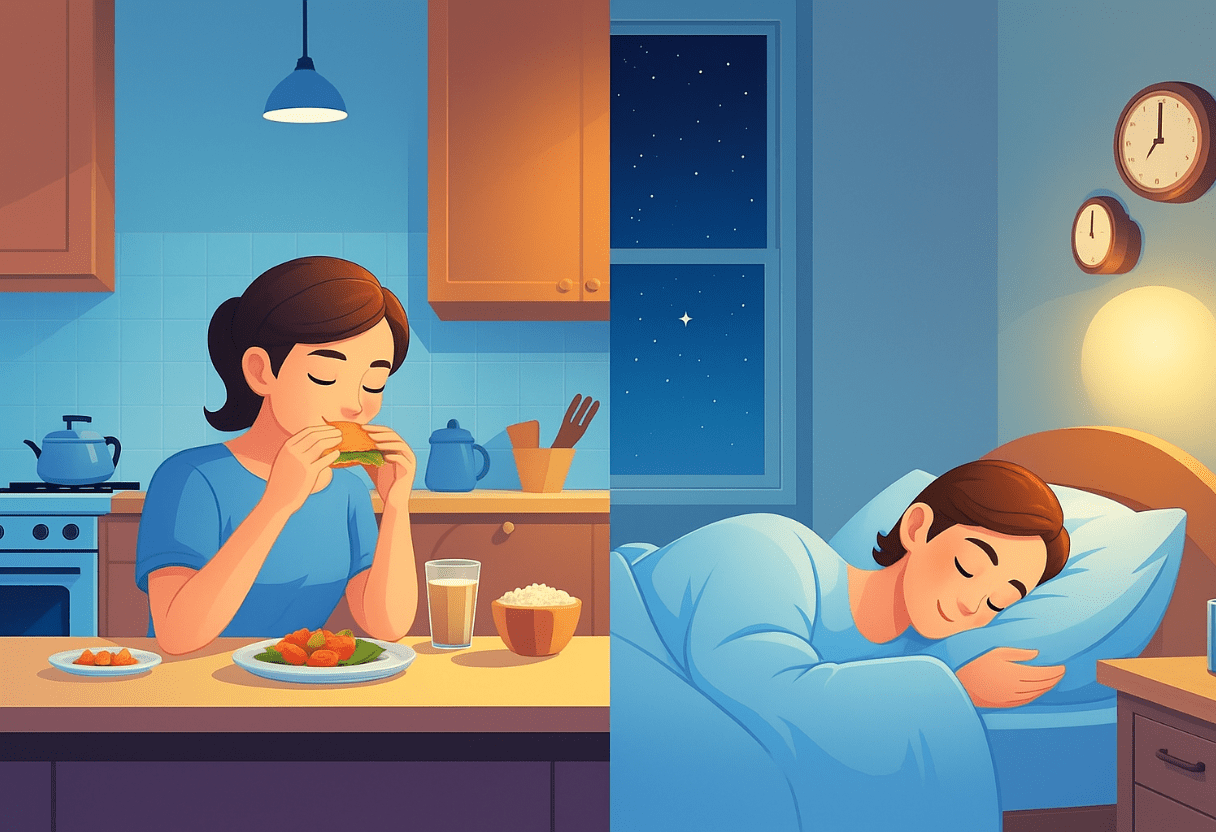
Many ideas about eating late at night aren’t fully accurate. Some beliefs focus on weight gain, while others assume that all late eating is bad for your health. The truth actually depends on the person and how their body responds.
The Eating Before Bed Myth
The idea that eating before bed always causes weight gain is false. Research shows that people who eat late don’t necessarily gain more weight as long as their total calorie intake stays the same. However, some studies suggest that eating at night may lead to more weight gain in certain situations.
This myth overlooks other factors like the quality of meals and how eating is spaced throughout the day. For example, eating heavy or sugary foods right before bed can affect sleep quality and digestion. But simply eating calories late doesn’t automatically cause weight gain. How the body’s metabolism works and how active a person is during the day also matter a lot.
Is It Always Bad To Eat At Night
Eating late isn’t harmful for everyone. Its effects depend on your overall health and conditions like acid reflux or diabetes. For some people, eating close to bedtime can cause discomfort, like heartburn, because the body produces stomach acid and digestive enzymes during sleep.
Eating late at night can also affect how the body manages blood sugar. People with diabetes might have worse blood sugar control when eating before bed. But for others, a small, balanced snack can actually be helpful and may even keep them from waking up hungry.
Eating late at night can affect your sleep and digestion, so picking the right foods is important. Avoid heavy or spicy meals that might cause discomfort. Instead, choose light, nutritious snacks that help keep your blood sugar stable and prevent you from getting hungry during the night.
What Not to Eat Before Bed
Foods that are high in sugar, caffeine, or fat should be avoided before sleep. Sugary and greasy foods can lead to indigestion and mess with your sleep patterns. Spicy dishes can cause heartburn or acid reflux, making it hard to fall asleep. Caffeine, which you’ll find in coffee, tea, chocolate, and some sodas, is a stimulant that can delay or reduce your sleep quality, even hours after you’ve had it.
Large or heavy meals put extra strain on your digestive system. This can make you uncomfortable and interfere with your natural sleep cycle.
Ideal Foods for a Light Night Meal
The best evening snacks are low in sugar and fat but rich in protein or fiber. Foods like yogurt, a small portion of nuts, or a banana are great choices. They help keep your blood sugar balanced and curb hunger without causing digestive issues. Complex carbs like whole-grain crackers or oatmeal can also promote sleep by boosting serotonin levels. A little lean protein, like turkey, has amino acids that support relaxation.
A light snack about 30 to 60 minutes before bed might help keep you from waking up hungry and help you sleep better. For more details on healthy late-night eating habits, check out this page on healthy eating before sleep.
A supportive mattress can make a big difference in getting better sleep after eating at night. Eating close to bedtime can sometimes lead to acid reflux, heartburn, or general discomfort that can interfere with sleep. A mattress like the Helix Midnight Luxe can help. Its pressure-relieving memory foam and zoned lumbar support help keep your spine aligned, which may ease discomfort and promote better sleep.
The mattress’s design also helps minimize movement, so you can shift positions without disturbing your rest. Having a stable, comfortable surface is especially helpful if you experience digestive discomfort after a late-night snack. A mattress that supports good sleep posture can reduce the impact of digestion on your sleep quality, helping you fall asleep faster and stay asleep longer. Investing in a quality mattress helps you wake up feeling refreshed and ready to face the day, even if you occasionally eat before bed.







